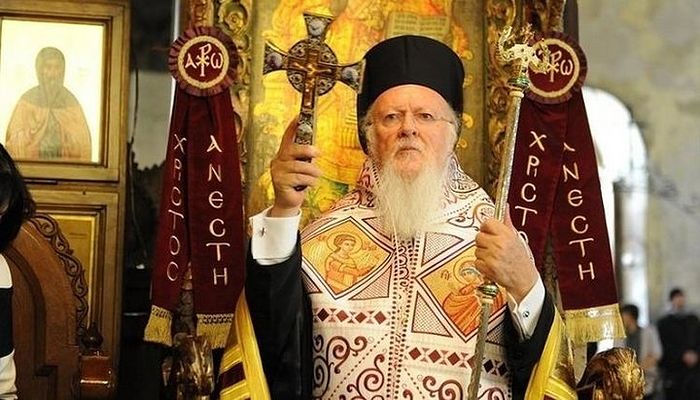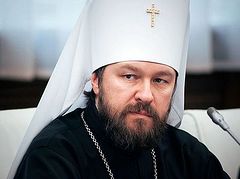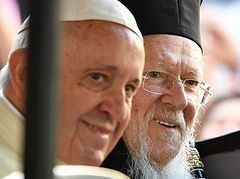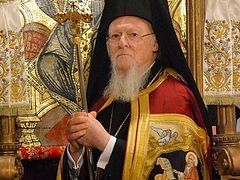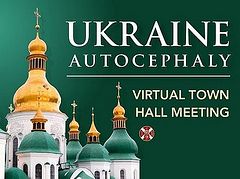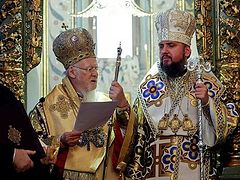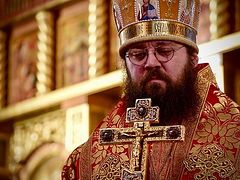The author of this analysis, Alexei Smirnov, is a leading religion columnist in Ukraine. Mr. Smirnov writes for top Ukrainian media such as Vesti, and the 112 TV channel. He is also an expert in religious studies for NewsOne TV channel.
In his interview with the Bulgarian news agency BGNES, Patriarch Bartholomew said, “The decisive factor that motivated the Ecumenical Patriarchate to grant autocephaly to Ukraine was its desire to heal the existing schism and restore Church unity in that country.” According to Bartholomew, it was for this good purpose that he took advantage of his privilege to accept appeals against the decisions of other Local Orthodox Churches and to provide autocephaly, without taking anyone else’s opinion into account.
Bartholomew’s words about restoring Church unity sound pretty on the outside. However, his actions are far from being in accordance with the canons adopted in Orthodoxy, according to which the Patriarch of Constantinople is only “the first among equals” (primus inter pares) and does not have direct authority and special decision-making powers over and beyond those exercised by the other Primates. Most importantly, his actions have directly led to the completely opposite result—instead of unification, they have caused an even greater schism in Ukrainian Orthodoxy.
Here are the latest facts.
On June 20, 2019, at the St. Volodymyr [Vladimir] Cathedral in Kyiv, the Honorary Patriarch of “OCU” Philaret convoked a “Local Council of the Ukrainian Orthodox Church of the Kyiv Patriarchate” where he proclaimed the full resumption of UOC-KP activities.
The participants of the “Local Council” adopted a summary resolution of ten clauses, in which they withdrew their signatures from the decision made at the Unification Council of December 15, 2018 concerning the liquidation of the UOC-KP and the creation of the “OCU”, instead proclaiming that the Kyiv Patriarchate will be resuming its activities under the lifelong leadership of “Patriarch” Philaret. They also declared their exclusive rights to manage monasteries, and Ukrainian and foreign dioceses that were formerly part of the UOC-KP. In addition to this, Philaret and the members of his “Council” refused to recognise those conditions of the Tomos that “deprived the Ukrainian Church of its foreign parishes and made it completely dependent upon the Patriarchate of Constantinople.”
Philaret, disillusioned by the insignificant support shown by his former hierarchs of the Kyiv Patriarchate, ordained two new bishops, blessing them to take their places in the newly formed UOC-KP Synod, which had resumed its work. He reminded everyone present that the Primate of the “OCU” and most of its bishops had been ordained by him without any support or recognition by the Patriarchate of Constantinople and the other Local Orthodox Churches.
In response to the actions of Philaret, the Extraordinary Synod of the “OCU”, held on June 24, stripped the Honorary Patriarch of his status as administrator of the Kyiv Diocese, expelled his closest supporters from its episcopate and announced that Kyivan churches and monasteries will be placed under the jurisdiction of “Metropolitan” Epiphany.
Thus, after a period of only six months, Ukrainian Orthodoxy now finds itself in the same predicament that it was in prior to the creation of the so-called “OCU” and the granting of the Tomos of Autocephaly by Patriarch Bartholomew. Only now, instead of the schismatic UAOC (along with the canonical UOC and the schismatic UOC-KP), there is now a newly created Constantinople-controlled, so-called “OCU” in operation. And Church disputes have been replaced by raider seizures as well as by attacks on churches, all happening with the active participation of government officials and armed radical ‘activists’. Until recently, the main victims of these illegal actions were clergymen and parishioners of the Ukrainian Orthodox Church (UOC). Now, literally a day after the “Council” of the UOC-KP, Philaret and the clergy who support him have begun complaining about insults and threats levelled against them as well as the forcible seizures of churches formerly belonging to the UOC-Kyiv Patriarchate.
The true Goals of Patriarch Bartholomew
The facts of a deepening schism in Ukrainian Orthodoxy are so eloquently stated that Bartholomew who “aspires to restore Church unity” should immediately if not revoke the Tomos granted to the “OCU” (as he did in November 2018 regarding the Western European Exarchate of Russian parishes), then at the very least convene a Pan-Orthodox Synaxis to discuss the situation in Ukraine and appeal to the Ukrainian authorities, who are supporting one of the church organisations, to stop interfering in the affairs of the Orthodox Church.
However, the Patriarch of Constantinople isn’t doing anything of the kind and doesn’t intend to do so. The reason for this has got nothing to do with Bartholomew’s self confidence and belief in his own canonical correctness nor, indeed, in his desire to save face. The true reason is that the calculated actions of Bartholomew in Ukraine fully fit into the long-term strategy of the Phanar which is aimed at strengthening the position of the Constantinople Patriarchate and establishing its authority over the other Local Orthodox Churches. According to the logic of this strategy, Local Orthodox Churches should recognize the unconditional primacy of the Patriarch of Constantinople (analogous to the primacy of the Pope in the Catholic Church), his privilege to be the sole and supreme arbiter in all Church disputes, as well as his right to make individual decisions and establish Stavropegy in the territories of all Local Orthodox Churches. In addition to this, and according to this strategy, in the future Local Orthodox Churches should limit their activities exclusively to national borders and abandon their foreign dioceses in favour of The Phanar.
Bartholomew indicatively included all of his goals in the text of the Tomos of Autocephaly that was granted to the “OCU”. According to this Tomos, “The ‘Orthodox Church of Ukraine’ (‘OCU’) recognizes: 1) the Ecumenical Throne as its head, as supposedly do all the other Patriarchs and Primates”; 2) the “inalienable right of the Ecumenical Throne to establish Stavropegy everywhere”; 3) the “canonical responsibility of the Ecumenical Throne to make peremptory judicial decisions for all of the Local Orthodox Churches and; 4) that it [OCU] “cannot appoint bishops and establish parishes outside its state boundaries and must renounce its existing parishes in favor of the Ecumenical throne, which has canonical powers in the diaspora.” It is this very text that Bartholomew proposes all the Local Orthodox Churches recognize; thereby, confirming his special and unlimited powers in the Orthodox world.
By the way, Ukraine is not the only victim of the aggressive strategy of The Phanar. Over the past thirty years alone, the Patriarchate of Constantinople first swallowed up the American Exarchate of the Alexandrian Church, then established an autonomous Estonian Apostolic Orthodox Church on foreign canonical territory, and then transferred the American parishes of the Greek Orthodox Church of Jerusalem to its own jurisdiction. And in the interval between these seizures, it also forced the Greek Orthodox Church to hand over thirty-six parishes in the so-called “new Greek territories” to its control. After Ukraine, the next offensive actions of The Phanar may be aimed at: recognizing the Macedonian and Montenegrin Churches (these are in the canonical territory of the Serbian Orthodox Church), the Abkhazian Church (located on the canonical territory of the Georgian Orthodox Church), as well as swallowing up other dioceses and parishes belonging to the Antiochian, Russian, Romanian and the Bulgarian Orthodox Churches in Western Europe, Australia and North America (which the Patriarchate of Constantinople is particularly interested in).
If in the course of Phanar’s realization of its long-term strategy, the Primates and Councils of the Local Orthodox Churches do not act against it collectively, then World Orthodoxy may change in the most radical way, and the Patriarch of Constantinople from the “first among equals” (primus inter pares) will be transformed into a new Eastern Pope (primus sine paribus) with unlimited powers throughout the Orthodox world. The result of such a transformation could indeed be a dystopian restoration of Church unity under the dictates of the Ecumenical Throne and the complete eradication of Orthodox conciliarity. This may even lead to a new global union, following the Lyon and Florentine unions, between the Pope of Rome and the Patriarch of Constantinople.

